Destination
Bali
Bali was called “the morning of the world” by Nehru and
is still “the island of the gods” to the Balinese. With
its colorful temple ceremonies and sacred mountains, its
cascading rice fields and tropical beaches, its rich traditions
of music, dance and theatre, and the hospitality of the
islanders, it is a destination with a difference.
Renowned
since the 1920s as an island paradise, the strength with
which the Balinese still hold this ideal is a principal
reason for the island’s cultural integrity. Though 1930s
writers mourned the soon-to-be demise of the island’s rich
traditions as a result of tourism, almost everything then
written about – ceremonies, religion, lifestyle, generosity,
humor and hospitality – can still be seen in Bali today.
It is true that “the real Bali” has become harder to
find, but it is seldom far away. A walk in the rice fields
is a good way to start. The island’s culture, religious
roots and oldest social institutions are all devoted to
the cultivation of rice. Another good way to connect with
Bali is to stay at accommodations that show sensitivity
to cultural integrity, where staff have time to sit and
talk about their culture and way of life, and may invite
you to their community ceremonies.
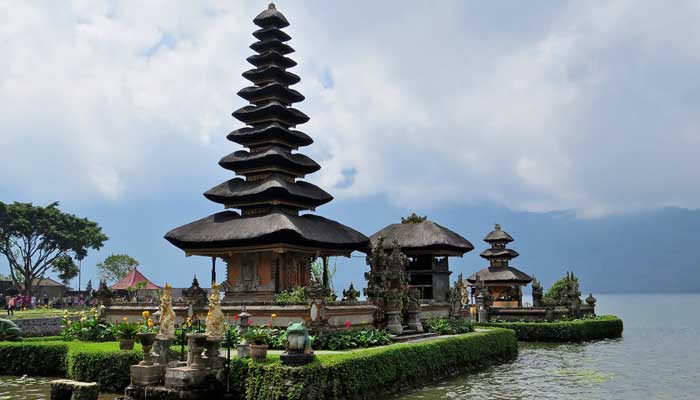
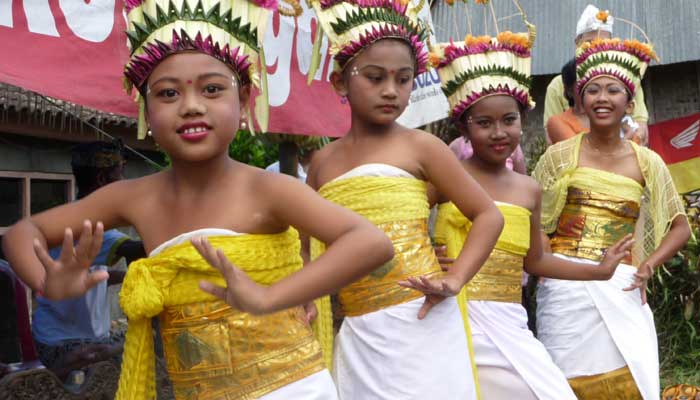
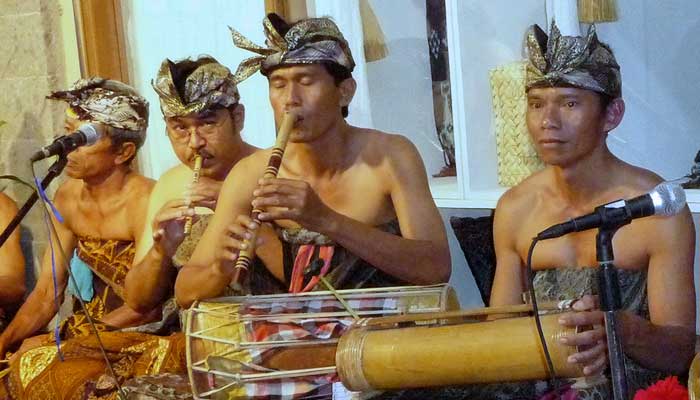
Ubud
Ubud is regarded as the cultural center of the island and
is where a journey into the heart of Bali can begin. Half a
dozen troupes perform traditional dance and gamelan music every
night to world-class standards. Temple ceremonies, weddings
and cremations are lavish public spectacles. Surrounding villages
specialize in the cultural arts. There are several schools of
painting, woodcarving and stone sculpting.
As a base it
affords access to the highlands, from the rain forests on the
slopes of Mount Batukaru, to the volcanic rawness of the Mount
Batur caldera, and Bali’s central temple complex on Mount Agung.
Besides its cultural grandeur Ubud boasts an elevation that
takes the sting out the seaside heat while avoiding the rains
of even slightly higher altitudes.
As a destination it serves
world-class food in a wide variety of local and international
restaurants. Where the seaside resorts of the island’s south
coast are just getting going by 10 pm, Ubud has already gone
to bed.
Relax, restore and renew have become the modern
mantras, be this through reading by the pool, walking through
the countryside and villages, or enjoying the affordable luxury
of Ubud’s spas and massage. A growing center for the study of
yoga, there are classes available for all interests and levels.
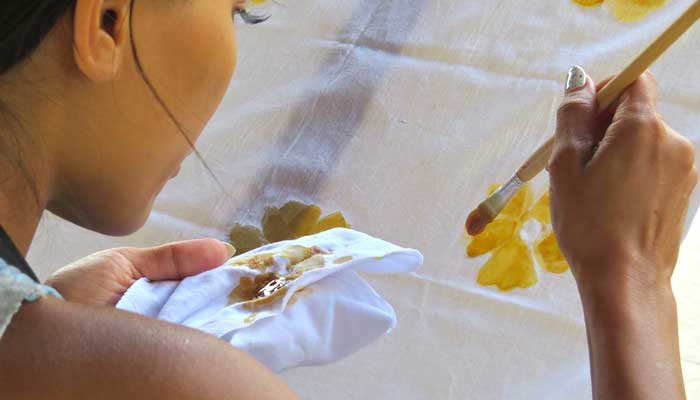

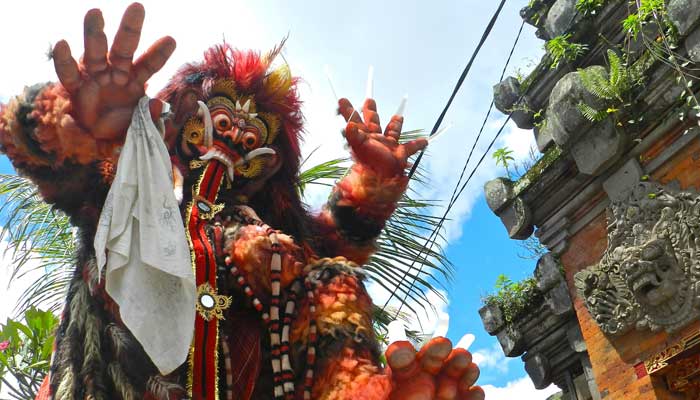
Balinese Culture
Bali is one of Indonesia’s 17,500 islands and with nearly
4 million inhabitants is home to less than 2% of the nation’s
240 million population. 97% of Balinese are Hindu, though the
islanders’ practices are scarcely recognizable as having come
from India. Syncretic to a high degree with ancient animism
and ancestor worship, and with a firm Buddhist foundation, Bali’s
Hindu practices were referred to as the “religion of holy water”
until early last century. Rituals are divided into five categories:
ceremonies for the gods, held in temples; life transition ceremonies
including babies’ rites, tooth filings after puberty, and weddings;
animistic ceremonies for the earth spirits; death rites and
the ceremonies that lead to the deification of the deceased;
and the initiatory rituals for priests.
Auspicious days for
these ceremonies are determined using Bali’s complex 210-day
calendar and an ancient Indian solar-lunar calendar. There is
always a ritual going on somewhere and each rite is always both
the completion of a previous ceremony and the preparation for
some future one. Among several overarching philosophies, the
two that most help the visitor understand Bali are the ideas
of Tri Hitha Karana – the obligation upon all Balinese to maintain
harmonious relations with each other, with the natural world
and with the gods – and Rwa Bhineda – the dualities around which
the world is balanced, including good and bad, dark and light,
seen and unseen. This last, called Sekala Niskala, describes
the Balinese experience of a spirit reality behind everything
in the physical world.
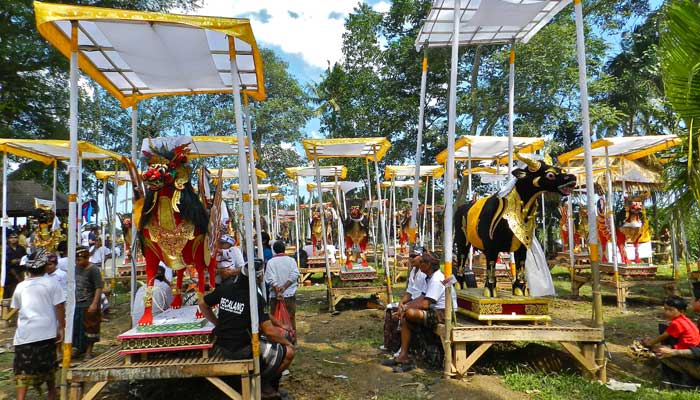

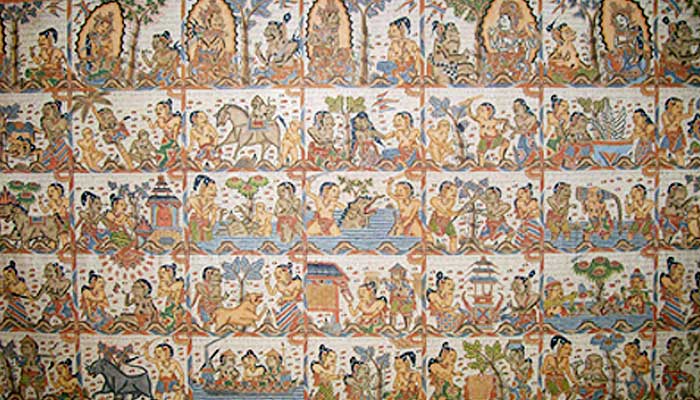
Bali’s Calendar
Traditional culture in Bali functions on two calendar systems.
The first is a 210-day cycle determined by the intercalation
of a 2-day week, a 3-day week, a 5-day week and a 7-day week
(2 x 3 x 5 x 7 = 210). This system, called the Wuku
calendar, is of Javanese origin. The second is the solar-lunar
Saka system from India that runs 78 years behind the
Gregorian calendar we are used to. (2012 in the Gregorian calendar
is 1934 in the Saka calendar. The Wuku calendar
produces auspicious and inauspicious days at frequent intervals.
For example, every fifth Saturday (5 x 7 days) is dedicated
to a different celebration, including the honoring of farm animals,
productive plants, shadow puppets, and metal tools (which now
includes cars). Every fifteen days (3 x 5) is considered inauspicious
and is dedicated to the earth spirits with extra offerings placed
on the ground. The majority of temple ceremonies are determined
by the Wuku calendar, occurring once in every cycle,
or approximately every 7 months.
The ten days between Galungan and Kuningan
(from the Wednesday of the 11th seven-day week to the Saturday
of the 12th seven-day week) is a time when the ancestors are
honored in every household’s family temple and sees the
whole island decked in color. Every front gate is marked by
an arching decorated bamboo pole that represents one of the
mythological serpents wrapped around the foundations of the
world. Many temples have their festivals in the weeks immediately
after Galungan, so this is always a good time to be
in Bali. New moon and full moons are considered powerful, although
because they are calculated numerically, the calendar is sometimes
a day out of sync with the actual full or new moon. Families
always make offerings at the village temples for the full and
new moon, and major temple ceremonies are often celebrated on
a full or new moon on the Saka calendar.
The Balinese new year, called Nyepi, is a date on the
Saka calendar, and is the day after one of the new
moons on either side of the northern hemisphere’s spring
equinox. The Saka calendar coming from India, this
is a celebration from a northern semi-tropical climate, where
seasonality mattered and the spring equinox marked the start
of the agricultural year. The Balinese celebration is marked
by an island wide exorcism and a raucous procession of demonic
effigies through the center of a village on the night before
Nyepi, and then a day of complete silence for Nyepi
itself, so that the banished spirits are not tempted to come
back. The airport is closed, as are all roads. You are fined
if caught out on the street, and in its purest application,
no lights are turned on, no cooking is done, and there is no
TV or radio. It is only when everything stops that you realize
what peace and quiet really mean.
Massage
Massage in Bali has come a long way from the village traditions of deep massage to heal the muscular aches of rice farmers. While this work can still be found, it has been augmented from traditions around the world, creating a cosmopolitan style that relaxes, rejuvenates and renews, with whatever level of associated pampering you may desire.

Spa Hati
( http://www.spahatibali.com )
The day spa closest to Umajati, Spa Hati is the commercial enterprise of the Bali Hati Foundation, which runs educational and health related programs for disadvantaged Balinese. A massage at Spa Hati makes you feel good in body and soul.

Maya Ubud Spa
( http://mayaubud.com/spa-maya/spa-maya )
Also on the same side of Ubud as Umajati, the spa at the Maya Ubud hotel offers a full sensory experience, with great massage offered in pavilions by a rushing river in a deep, forested gorge.
Yoga Classes
Ubud is one the world’s premier yoga vacation destinations. The combination of the Hindu Balinese culture, a warm tropical climate and a beautiful landscape make this an attractive and rewarding place to practice and study. A number of very competent schools with well-trained teachers have been opened, and classes may be found in numerous traditions now familiar in the West.

The Yoga Barn
( http://www.theyogabarn.com )
On the southern edge of Ubud, the Yoga Barn offers classes in a variety of traditions starting 7.00 am to 7.30 pm. The Yoga Barn and the related Kafe restaurant have become the hubs of Ubud’s yoga scene, and are the place to start when looking for classes.
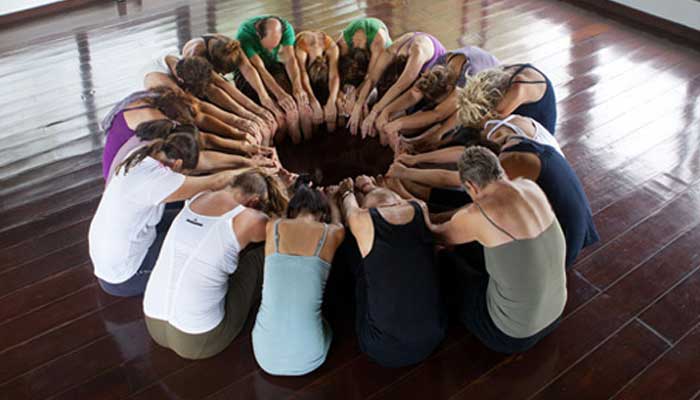
Intuitive Flow
( http://www.intuitiveflow.com )
This small studio on the west of Ubud, in Penestanan, offers classes inspired by the teacher’s studies with a local Balinese healer that communicate a genuine local healing tradition. Most of the daily classes are 9.00 to 11.00 am and 5.30 to 7.00 pm.
Further Reading
A Little Bit One O'Clock: Living with a Balinese
Family
by Umajati owner William Ingram
 An honest, heart-warming portrait of a Balinese family,
and an exploration of the web of relationships that ties
the family members to each other, their community, and their
ancestors. Ingram's book affirms some of our notions of
Bali as a paradise, dispels others, and reveals a resilient
people who forgive life its tragedies and celebrate its
gifts. 240 pages. Ersania Books, Ubud (1998)
An honest, heart-warming portrait of a Balinese family,
and an exploration of the web of relationships that ties
the family members to each other, their community, and their
ancestors. Ingram's book affirms some of our notions of
Bali as a paradise, dispels others, and reveals a resilient
people who forgive life its tragedies and celebrate its
gifts. 240 pages. Ersania Books, Ubud (1998)
The Painted Alphabet: A Novel based on a Balinese
Tale
by Diana Darling
 Magic, depravity, spiritual ambition, sensuality, and love.
The Painted Alphabet binds mythic and modern time together
in a rich, slyly suggestive novel based on an old Balinese
epic poem. In a fresh and startling picture of Bali - where
witches coexist with tourists and talking animals - the
novel explores a kaleidoscope of vanity, desire, and the
longing for goodness. 209 pages. Periplus, Singapore (2002)
Magic, depravity, spiritual ambition, sensuality, and love.
The Painted Alphabet binds mythic and modern time together
in a rich, slyly suggestive novel based on an old Balinese
epic poem. In a fresh and startling picture of Bali - where
witches coexist with tourists and talking animals - the
novel explores a kaleidoscope of vanity, desire, and the
longing for goodness. 209 pages. Periplus, Singapore (2002)
Island of Bali
by Miguel Covarrubias
 Written in the 1930s by a Mexican painter living in Bali,
this is the classic explication of the culture and lifestyle
of the Balinese. Very readable and beautifully illustrated,
most of what Covarrubias describes can still be found in
Bali today, proving unfounded his fears that tourism would
soon be the death of the island’s culture. 532 pages.
Hesperides Press (2008)
Written in the 1930s by a Mexican painter living in Bali,
this is the classic explication of the culture and lifestyle
of the Balinese. Very readable and beautifully illustrated,
most of what Covarrubias describes can still be found in
Bali today, proving unfounded his fears that tourism would
soon be the death of the island’s culture. 532 pages.
Hesperides Press (2008)
Bali: Sekala & Niskala, Volumes I and II
by Fred B. Eiseman, Jr.
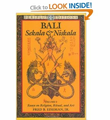 In Bali, what you see - sekala - is a colorful world of
ceremony, ritual, dance, and drama. What you don't see,
what is occult - niskala - is the doctrine underlying the
pageants, the code underlying the rites, and the magic underlying
the dance.
In Bali, what you see - sekala - is a colorful world of
ceremony, ritual, dance, and drama. What you don't see,
what is occult - niskala - is the doctrine underlying the
pageants, the code underlying the rites, and the magic underlying
the dance.
Volume I: Essays on Religion, Ritual, and Art
- Explores both tangibles and intangibles in the realm of
Balinese religion, ritual, and performing arts. 368 pages.
Periplus, Berkeley (1989)
![]()
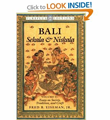
Volume II: Essays on Society, Tradition, and Craft
- Explores the tangibles and intangibles of Balinese geography,
social organization, language, folklore, material culture.
383 pgs. Periplus, Berkely (1990)
Balinese Dance, Drama & Music: A Guide to the
Performing Arts of Bali [Paperback]
by I Wayan Dibia and Rucina Ballinger
 This book is for anyone who wants to know more about the
music, dance and puppetry performances that can be seen
nightly in and around Ubud, or at temple ceremonies anywhere
on the island. Written by the island’s principle Balinese
and English-speaking authorities on the performing arts,
the book maintains an engaging style that shows the authors
know their subject matter with the intimacy of the seasoned
performers they both are. 112 pages. Tuttle Publishing (2011)
This book is for anyone who wants to know more about the
music, dance and puppetry performances that can be seen
nightly in and around Ubud, or at temple ceremonies anywhere
on the island. Written by the island’s principle Balinese
and English-speaking authorities on the performing arts,
the book maintains an engaging style that shows the authors
know their subject matter with the intimacy of the seasoned
performers they both are. 112 pages. Tuttle Publishing (2011)
Umajati’s Mission

Umajati is about cultural integrity, care for the environment,
and sustainable livelihoods.
A percentage of sales are committed
to conservation and livelihood development across Indonesia,
giving targeted, long-term mentoring to community groups for
sustainable change.



